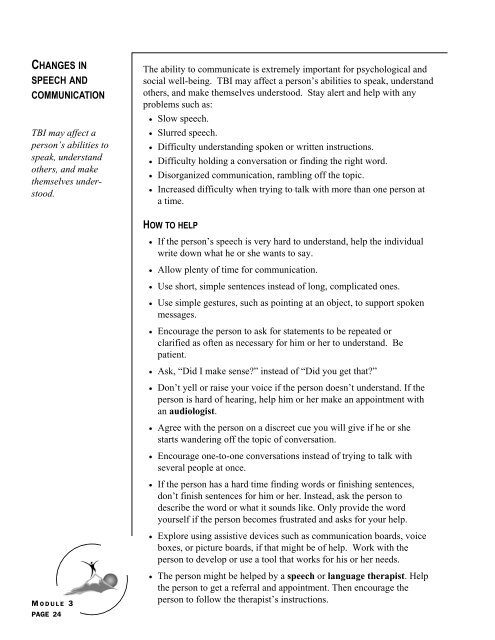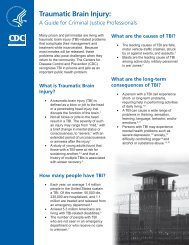caregiver tip - Traumatic Brain Injury Council
caregiver tip - Traumatic Brain Injury Council
caregiver tip - Traumatic Brain Injury Council
Create successful ePaper yourself
Turn your PDF publications into a flip-book with our unique Google optimized e-Paper software.
CHANGES IN<br />
SPEECH AND<br />
COMMUNICATION<br />
TBI may affect a<br />
person’s abilities to<br />
speak, understand<br />
others, and make<br />
themselves understood.<br />
The ability to communicate is extremely important for psychological and<br />
social well-being. TBI may affect a person’s abilities to speak, understand<br />
others, and make themselves understood. Stay alert and help with any<br />
problems such as:<br />
• Slow speech.<br />
• Slurred speech.<br />
• Difficulty understanding spoken or written instructions.<br />
• Difficulty holding a conversation or finding the right word.<br />
• Disorganized communication, rambling off the topic.<br />
• Increased difficulty when trying to talk with more than one person at<br />
a time.<br />
HOW TO HELP<br />
• If the person’s speech is very hard to understand, help the individual<br />
write down what he or she wants to say.<br />
• Allow plenty of time for communication.<br />
• Use short, simple sentences instead of long, complicated ones.<br />
• Use simple gestures, such as pointing at an object, to support spoken<br />
messages.<br />
• Encourage the person to ask for statements to be repeated or<br />
clarified as often as necessary for him or her to understand. Be<br />
patient.<br />
• Ask, “Did I make sense” instead of “Did you get that”<br />
• Don’t yell or raise your voice if the person doesn’t understand. If the<br />
person is hard of hearing, help him or her make an appointment with<br />
an audiologist.<br />
• Agree with the person on a discreet cue you will give if he or she<br />
starts wandering off the topic of conversation.<br />
• Encourage one-to-one conversations instead of trying to talk with<br />
several people at once.<br />
• If the person has a hard time finding words or finishing sentences,<br />
don’t finish sentences for him or her. Instead, ask the person to<br />
describe the word or what it sounds like. Only provide the word<br />
yourself if the person becomes frustrated and asks for your help.<br />
• Explore using assistive devices such as communication boards, voice<br />
boxes, or picture boards, if that might be of help. Work with the<br />
person to develop or use a tool that works for his or her needs.<br />
M ODULE 3<br />
PAGE 24<br />
• The person might be helped by a speech or language therapist. Help<br />
the person to get a referral and appointment. Then encourage the<br />
person to follow the therapist’s instructions.






